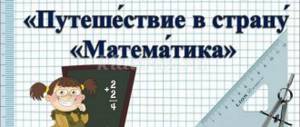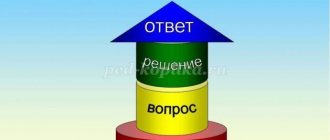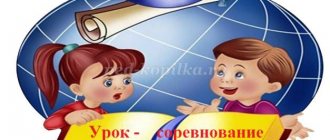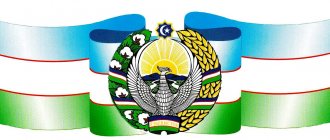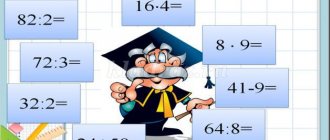Goals, objectives and principles of extracurricular work for junior schoolchildren in mathematics
Bibliographic description:
Soroka, O. A. Goals, objectives and principles of extracurricular work for junior schoolchildren in mathematics / O. A. Soroka. — Text: immediate // Current issues of modern pedagogy: materials of the VIII International. scientific conf. (Samara, March 2020). - Samara: ASGARD Publishing House LLC, 2020. - P. 189-192. — URL: https://moluch.ru/conf/ped/archive/188/9940/ (access date: 10.10.2020).
This article is devoted to one of the important areas in the work of a teacher - extracurricular activities. Extracurricular activities are considered within the framework of the implementation of the Federal State Educational Standard of NEO. The author has formulated the priority goals and objectives of extracurricular work for junior schoolchildren in mathematics. The article reveals the system of extracurricular work for junior schoolchildren in mathematics and gives their characteristics.
Key words: goals, objectives, principles of extracurricular work, development of interest in mathematics, universal educational activities, Federal State Educational Standards of NEO.
The modern basic educational program of primary general education is implemented by an educational institution through the organization of classroom and extracurricular activities. Extracurricular activities within the framework of the implementation of the Federal State Educational Standard for Primary General Education (FSES IEO) should be understood as educational activities carried out in forms other than classroom activities and aimed at achieving the planned results of mastering the basic educational program of primary general education [3].
In accordance with the Federal State Educational Standard of NEO, extracurricular activities are organized in the areas of personal development: sports and recreational, spiritual and moral, social, general intellectual, general cultural [1]. Most often, extracurricular work in mathematics is understood as activities aimed at increasing children’s interest in mathematics, promoting the development of their powers of observation and ingenuity, and occupying their leisure time with interesting games and entertainment of mathematical content.
Skillfully organized and methodologically well-constructed extracurricular work in mathematics expands and deepens students’ knowledge of program material, develops their mathematical abilities and mathematical thinking, and forms cognitive universal learning activities.
Extracurricular mathematics classes are conducted for various purposes. As with the main activities conducted in the classroom, the goal determines the content, nature, and organization of extracurricular work with children. It is necessary to distinguish:
extracurricular work with students who are lagging behind others in studying program material (additional mathematics classes);
extracurricular work with students who show interest in mathematics (extracurricular work in the traditional sense).
Extracurricular work with students who are lagging behind others in studying program material has the following goal - to provide assistance in academic work to those students who, due to illness or for any other reason, have difficulty reviewing new material and are lagging behind the general pace of class work . This work is predominantly individual in nature. For success in this case, it is absolutely necessary to have exact knowledge of the reasons for the lag of a particular student and to take into account the mistakes he makes. When teaching a child in whose knowledge one or another gap has been discovered, the teacher most often has to turn to the previously discussed methods of reasoning, calculation methods, etc., using various means of visualization. At the same time, it is very important to guide the student again through all the main steps in mastering the relevant material. This will help to find out which of them he “stumbles” on, what exactly was not mastered enough to pay special attention to these issues.
A teacher makes a big mistake if, seeing that a student cannot cope with some new type of exercise that requires, for example, the use of a new computational technique, during individual work with him he offers him only exercises similar to those performed in class. As a rule, much more benefit comes from doing exercises that prepare you to understand something new. The best result of an individual lesson with a child in such cases will be if, after appropriate preparation, he can independently cope with the work that turned out to be too much for him in the lesson.
If we are talking about the formation of some kind of generalization that the child did not understand in the lesson, then in this case, on the contrary, during individual lessons it will be necessary to consider a number of more examples similar to those discussed in class in order to ultimately lead the student to the appropriate conclusion. In carrying out such work, various teaching materials, cards with mathematical tasks, and visual aids that contain material that complements the textbook can be of great benefit.
Classes aimed at filling gaps in students’ knowledge may also be of a group nature, but it makes sense to unite children in such groups only after it has been discovered that the nature of the difficulties they encounter is common.
Individual work with individual students can be aimed not only at eliminating existing gaps in their knowledge, not only at additional training, but also at preparing for the consideration of new material in the upcoming lesson. Such help preventing difficulties from arising in many cases turns out to be much more productive than the help that the teacher is forced to provide after misunderstanding has arisen. It not only contributes to the child’s better assimilation of the material, but also creates better conditions for working in the lesson itself, where new material is discussed.
The type of extracurricular activities that we are talking about now should not be systematic for any of the students in the class. Classes are held only in cases of extreme necessity and purposefully, taking into account individual differences in the preparation of children to consider each specific issue. Otherwise, this can only lead to an overload of the child with academic activities, fatigue, which can interfere with his normal studies. The main work with all students in the class should be carried out in class.
Extracurricular work under the guidance of a teacher with students who show an interest in mathematics will be completely different in content and nature. In this case, the following goals can be established as the main goals of extracurricular work:
awakening and development of students’ sustainable interest in mathematics;
expansion and deepening of students’ mathematical knowledge of program and extra-program material;
development of students’ mathematical abilities, observation, and ingenuity;
- fostering a culture of mathematical thinking.
As a special goal of education, it is necessary to consider teaching children to apply acquired knowledge, skills and abilities when performing a variety of educational exercises. At the same time, the application of knowledge is also one of the most important means of increasing the effectiveness of children’s educational work itself. Psychologists have proven that the full assimilation of knowledge, skills and abilities can be achieved only in conditions of their active independent application in changing conditions. If the teacher does not pay special attention to the variety of conditions in which children must mobilize their accumulated knowledge, but accustoms them to the same type of questions, tasks, formulations, tasks, then this will aggravate the difficulty of the transition to subject learning in the 5th grade.
This issue is inextricably linked with the more general task of developing cognitive abilities in children. Already in elementary school, much should be done to develop in children the ability to observe and compare, highlight similarities and differences in compared phenomena, and perform such mental operations as analysis, synthesis, generalization, abstraction, and concretization.
Inextricably linked with the task of developing the ability to think logically in children is the question of developing their correct, subtle, concise mathematical speech. This is also one of the important tasks of primary education that can be realized in the process of working on entertaining extracurricular mathematics.
In accordance with the goals formulated above, we will determine the priority tasks of extracurricular activities for junior schoolchildren in mathematics:
study and identification of educational and cognitive interests of students;
identification and support of mathematically gifted students;
awakening the need among schoolchildren to independently acquire new knowledge;
formation of positive motivation for participation in extracurricular mathematics classes;
deepening the understanding of the practical orientation of mathematical knowledge,
development of the ability to apply mathematical methods in resolving plot situations.
The principles of learning are in the nature of the most general instructions, rules, and norms governing the learning process. The principles are born on the basis of scientific analysis of learning and correlate with the laws of the learning process [2, P. 200]. To increase the effectiveness of extracurricular work, we will formulate the fundamental principles in accordance with which it is necessary to build this work:
- The principle of reaching all students. In primary classes, where children aged 7–9 years old study, it is too early to talk about any existing interests that children have in one area or another. Therefore, it would be wrong to single out “those who are more interested in mathematics” and “show great abilities” for it for extracurricular work. The goal of this work is to increase interest in mathematics in all children. Extracurricular activities can help awaken interest in mathematics in those children who do not initially show it. Lack of interest at this age is most often associated simply with a lack of knowledge, with difficulties arising when completing the proposed tasks. It often happens that a student who does not always successfully cope with academic work in mathematics lessons, shows enviable ingenuity and resourcefulness in entertaining mathematics. This strengthens his faith in his own strength, the child has a desire to prove himself no worse in class, and he begins to study better in general.
In connection with the above, it is better to conduct extracurricular mathematics classes in the primary grades of school mainly in the form of simultaneous classes with all students in the class.
- The principle of voluntariness. According to this principle, extracurricular activities (although they will, in principle, be carried out with the entire class) are voluntary. Forcing children to participate in this work would be a big pedagogical mistake. To avoid dropout of students attracted to these classes, it is important that these classes are really interesting, so that they captivate the children and appeal to them. This does not mean that extracurricular work should be exclusively entertaining in nature, not requiring any mental stress from children. On the contrary, there should be no simple entertainment, jokes and games that have nothing to do with mathematics in these classes. All work should be based on such material that can arouse keen interest in children, the desire to “rack their brains” over the questions posed, the desire to play the proposed games not only during classes conducted by the teacher, but also at home, the desire to understand the “secret” of the shown mathematical tricks in order to show them later to your friends, parents, brothers, sisters, etc.
An indispensable condition for this is the availability of the classes. Children still have a very limited stock of mathematical knowledge, but it is precisely this that should be considered a support in such work. Hence the requirement for an inextricable connection between extracurricular work and that which is carried out in the classroom during lessons.
If the content of extracurricular work is firmly connected with the training program, then this, on the one hand, will create conditions for the successful completion of tasks offered during extracurricular work, and on the other hand, it will certainly have a positive impact on the assimilation of the program.
- The principle of diversity. To awaken and maintain interest in entertaining mathematics classes, it is necessary to diversify this work. This diversity should be manifested in the content of the selected material, and in the forms of organization of classes, and in the visual aids and technical teaching aids used during these classes.
All of the above principles complement each other and together provide a targeted, consistent, systematic and at the same time versatile influence on the development of the student’s personality.
Thus, the implementation of extracurricular activities in mathematics in conjunction with the development of the main program helps to expand the mathematical horizons and erudition of students, and the formation of cognitive universal educational activities. It should be noted that in the real learning process, the above goals, objectives and principles should be specified in accordance with the characteristics of the class, the teacher himself and school-wide extracurricular work.
Literature:
- On the approval and enactment of the federal state educational standard for primary general education: order of the Ministry of Education and Science of October 6, 2009 No. 373 (as amended on December 31, 2015) [Electronic resource] Access mode: https://Ministry of Education and Science.rf/documents/543 . Date of access: 02/25/2016.
- Pedagogy. Textbook / Ed. P.I. Pidkasisty. - M.: Ped. Society of Russia, 1998. - 640 p.
- Letter of the Ministry of Education and Science of the Russian Federation dated May 12, 2011 N 03–296 “On the organization of extracurricular activities with the introduction of the federal state educational standard of general education.” [Electronic resource] Access mode https://www.consultant.ru/document/cons_doc_LAW_114121/. Date of access: 02/25/2016.
Key terms
(automatically generated)
: extracurricular work, lesson, extracurricular activity, mathematician, child, work, primary general education, program material, student, class student.
